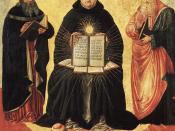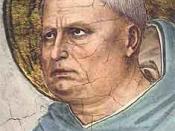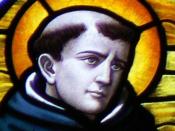Natural law would view abortion as wrong because it interferes with the fetus's "quest" toward its divine destiny of completed potentiality as a human being. "Thomas Aquinas, On the Truth of the Catholic Faith, book II, ch. 89, reflected the influence of Aristotle's views on human development: "The vegetative soul, which comes first, when the embryo lives the life of a plant, is corrupted, and is succeeded by a more perfect soul, which is both nutritive and sensitive, and then the embryo lives an animal life; and when this is corrupted, it is succeeded by the rational soul introduced from without [i.e., by God]." This "delayed humanization" view was confirmed as Catholic dogma by the Council of Vienna in 1312, and has never been officially repudiated by the Vatican (Irvine)".
Norms must discriminate between good and evil and conform to the natural use of reason. A human act requires that both dynamics and content to exist.
An act must be the function of both the intelligence and the will. Intelligence requires acts to be true and the will demands that the act be good. The total good of man is tended toward by the will. Truth is the end of the intellect and love is the end of the will. Natural Law is the divine order by which all rational beings are on a course to achieve their potential.
Acts are viewed as good if they conform to our rational reason. Truth is the end of human reason and intellectual beings determines its end under the condition of good. God is the supreme and natural law is the participation of the eternal law in the rational creature. Practical reason dictates laws for the common good. Within one are the principles of movement and the will is the principle of...


